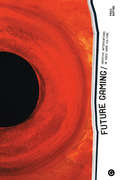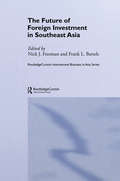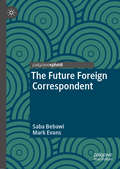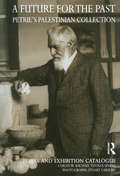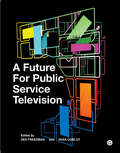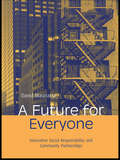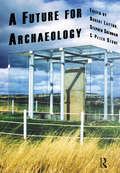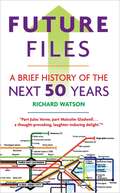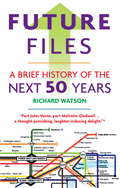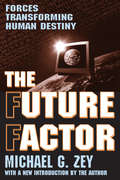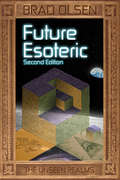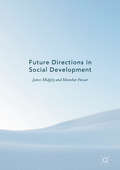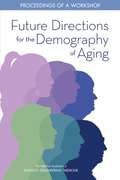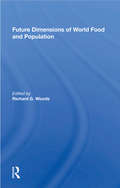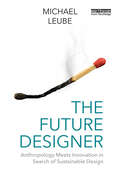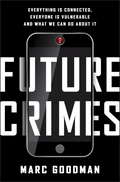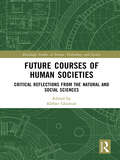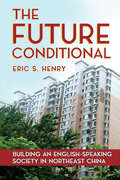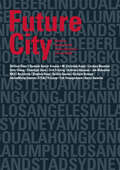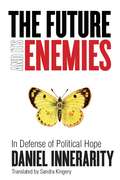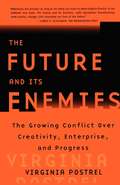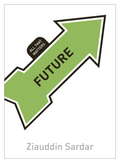- Table View
- List View
Future Girl: Young Women in the Twenty-First Century
by Anita HarrisAnita Harris creates a realistic portrait of the "new girl" that has appeared in the twenty-first century--she may still play with Barbie, but she is also likely to play soccer or basketball, be assertive and may even be sexually aware, if not active. Building on this new definition, Harris explores the many key areas central to the lives of girls from a global perspective, such as girlspace, schools, work, aggression, sexuality and power.
Future Gaming: Creative Interventions in Video Game Culture (Goldsmiths Press / Future Media Series)
by Paolo RuffinoA sophisticated critical take on contemporary game culture that reconsiders the boundaries between gamers and games.This book is not about the future of video games. It is not an attempt to predict the moods of the market, the changing profile of gamers, the benevolence or malevolence of the medium. This book is about those predictions. It is about the ways in which the past, present, and future notions of games are narrated and negotiated by a small group of producers, journalists, and gamers, and about how invested these narrators are in telling the story of tomorrow.This new title from Goldsmiths Press by Paolo Ruffino suggests the story could be told another way. Considering game culture, from the gamification of self-improvement to GamerGate's sexism and violence, Ruffino lays out an alternative, creative mode of thinking about the medium: a sophisticated critical take that blurs the distinctions among studying, playing, making, and living with video games. Offering a series of stories that provide alternative narratives of digital gaming, Ruffino aims to encourage all of us who study and play (with) games to raise ethical questions, both about our own role in shaping the objects of research, and about our involvement in the discourses we produce as gamers and scholars. For researchers and students seeking a fresh approach to game studies, and for anyone with an interest in breaking open the current locked-box discourse, Future Gaming offers a radical lens with which to view the future.
Future Foreign Investment SEA
by Nick J. Freeman Frank L. BartelsThis book explains the dynamics behind Southeast Asia's foreign investment activity, and looks at the region's options for reviving its reputation as an attractive host for foreign investors. Each chapter focuses on a key element; together, they portray southeast Asia's foreign investment profile and prospects. By bringing these key interlocking elements together under a single cover, the book aims to provide a more profound understanding of the challenges southeast Asian countries face in their on-going attempts both to attract new foreign investment inflows and to continue hosting substantial existing foreign-invested assets.
The Future Foreign Correspondent
by Saba Bebawi Mark EvansThis book articulates the skills and perspectives that future foreign correspondents need to adopt in an increasingly globalized world. By revisiting entrenched traditions in the training and practice of international reporting, The Future Foreign Correspondent examines the changing role of a correspondent, outlining aspects that will evolve, the skills that will continue to be pivotal and those becoming even more important, such as the need for greater cultural understanding within the global media sphere. This book is a must read for journalists, media students and researchers interested in understanding what needs to be taken into consideration when reporting transcultural news spheres.
A Future for the Past: Petrie's Palestinian Collection (UCL Institute of Archaeology Publications)
by Stuart LaidlawFlinders Petrie, known for his extensive work in Egypt, was also a pioneer of scientific archaeology in Palestine early in the 20th century through his excavations at Tell el-Hesi, Tell el-‘Ajjul, and elsewhere. This volume offers a critical analysis of Petrie’s contributions to the archaeology of Palestine and the role his collection of artifacts plays in modern studies of the ancient Near East. It also includes a full color catalog of 270 objects, dating from Chalcolithic to Ottoman times, excavated by Petrie.
A Future for Public Service Television (Goldsmiths Press Ser.)
by Edited by Des Freedman Vana GoblotA guide to the nature, purpose, and place of public service television within a multi-platform, multichannel ecology.Television is on the verge of both decline and rebirth. Vast technological change has brought about financial uncertainty as well as new creative possibilities for producers, distributors, and viewers. This volume from Goldsmiths Press examines not only the unexpected resilience of TV as cultural pastime and aesthetic practice but also the prospects for public service television in a digital, multichannel ecology. The proliferation of platforms from Amazon and Netflix to YouTube and the vlogosphere means intense competition for audiences traditionally dominated by legacy broadcasters. Public service broadcasters—whether the BBC, the German ARD, or the Canadian Broadcasting Corporation—are particularly vulnerable to this volatility. Born in the more stable political and cultural conditions of the twentieth century, they face a range of pressures on their revenue, their remits, and indeed their very futures. This book reflects on the issues raised in Lord Puttnam's 2016 Public Service TV Inquiry Report, with contributions from leading broadcasters, academics, and regulators. With resonance for students, professionals, and consumers with a stake in British media, it serves both as historical record and as a look at the future of television in an on-demand age.Contributors includeTess Alps, Patrick Barwise, James Bennett, Georgie Born, Natasha Cox, Gunn Enli, Des Freedman, Vana Goblot, David Hendy, Jennifer Holt, Amanda D. Lotz, Sarita Malik, Matthew Powers, Lord Puttnam, Trine Syvertsen, Jon Thoday, Mark Thompson
A Future for Everyone: Innovative Social Responsibility and Community Partnerships
by David Maurrasse Cynthia JonesThe original essays in this timely collection discuss the many ways to foster innovative and unprecedented collaborations leading to more effective partnerships between major institutions and corporations to poor and disenfranchised communities. Many of today's pressing issues are covered in-depth: bridging the digital divide; community reinvestment; university and corporate partnerships; and corporate responsibility.
A Future for Archaeology (UCL Institute of Archaeology Publications)
by Stephen Shennan Robert Layton Peter StoneOver the last thirty years issues of culture, identity and meaning have moved out of the academic sphere to become central to politics and society at all levels from the local to the global. Archaeology has been at the forefront of these moves towards a greater engagement with the non-academic world, often in an extremely practical and direct way, for example in the disputes about the repatriation of human burials. Such disputes have been central to the recognition that previously marginalized groups have rights in their own past that are important for their future. The essays in this book look back at some of the most important events where a role for an archaeology concerned with the past in the present first emerged and look forward to the practical and theoretical issues now central to a socially engaged discipline and shaping its future. This book is published in honor of Professor Peter Ucko, who has played an unparalleled role in promoting awareness of the core issues in this volume among archaeologists.
Future Files: A Brief History of the Next 50 Years
by Richard WatsonWlliam Gladwell meets Alvin Toffler in this lively, provocative and witty look at our possible futures. Filled with provocative forecasts about how the world might change in the next half century, Future Files examines emerging patterns and developments in society, technology, economy, and business, and makes educated speculations as to where they might take us. It is indispensable to business analysts, strategists and organisations who need to stay ahead of the game as well as providing rich and fascinating material for dinner party conversations. Will machines become more intelligent than humans, and even be able to 'read' our minds? Will food in our fridge speak to each other using radio waves, then come up with options for tonight's menu? Is there a looming environmental crisis where Planet Earth is doomed? Would you like a pill that improves your memory? ...Or a moistened tissue that could erase a bad day? Would you feel safer if your front door could tell you whether the person knocking is not a stranger? These are just some of the provocative forecasts about how the world might change in the next half century which Richard Watson explores in "Future Files".
Future Files: A Brief History of the Next 50 Years
by Richard WatsonWlliam Gladwell meets Alvin Toffler in this lively, provocative and witty look at our possible futures. Filled with provocative forecasts about how the world might change in the next half century, Future Files examines emerging patterns and developments in society, technology, economy, and business, and makes educated speculations as to where they might take us. It is indispensable to business analysts, strategists and organisations who need to stay ahead of the game as well as providing rich and fascinating material for dinner party conversations. Will machines become more intelligent than humans, and even be able to 'read' our minds? Will food in our fridge speak to each other using radio waves, then come up with options for tonight's menu? Is there a looming environmental crisis where Planet Earth is doomed? Would you like a pill that improves your memory? ...Or a moistened tissue that could erase a bad day? Would you feel safer if your front door could tell you whether the person knocking is not a stranger? These are just some of the provocative forecasts about how the world might change in the next half century which Richard Watson explores in "Future Files".
Future Files
by Richard WatsonFuture Files is filled with provocative forecasts about how the world might change in the next half century. It examines emerging trends and developments in society, technology, economy, and business, and makes educated speculations as to where they might take us.
The Future Factor: Forces Transforming Human Destiny
by Michael G. ZeyThe Future Factor offers an inspiring, optimistic view of the human future. Sociologist Michael G. Zey shows how breathtaking innovations in fields such as biotechnology, computing, robotics, medicine, energy development and space technology are catapulting global society into a new era of abundance and prosperity.As the third millennium begins, technological breakthroughs provide unprecedented opportunities for growth, profitability and organizational and personal reinvention. However, to stay ahead of the curve and anticipate future developments before competitors and peers do, leaders, companies and individuals must be equipped with the capacity to make informed decisions.In The Future Factor, Zey provides the sophisticated cutting-edge knowledge needed to achieve competitive advantage that individuals require to make career and life choices. Zey paints a big picture of new forces--biogenesis, cybergenesis, species coalescence and dominionization--that are subtly impacting society and the global economy and changing forever the way we live. Among the subjects explored in this wide-ranging book are: the role cybergenisis will play in making humans healthier; the universal communication network based on the Internet and virtual reality; biogenesis, gene therapy and decoding the human genome; "next generation" robots, smart machines and their impact on economic growth; the colonization of space and the advent of "space tourism"; fusion-based energy and its effect on the environment and global economy; global transportation and a worldwide superhighway; and biotechnological breakthroughs in agriculture and food production.
Future Esoteric: The Unseen Realms
by Brad OlsenExamining the flaws of mainstream society, this collection of conspiracy theory, esoteric knowledge, and fringe subjects seeks to present solutions to current social, economic, and environmental world issues. This book encourages the exploration and integration of modern science with ancient wisdom, which will lead modern society towards advancement and enlightenment. Topics discussed include religious mythos, government manipulation, technological advances, and utopia.
Future Directions in Social Development
by James Midgley Manohar PawarThis book invites readers to think about future directions in social development. The book succinctly presents the historical context and progress of social development. By reflecting on the Millennium and Sustainable Development Goals, it discusses the increasing global relevance of several critical themes and issues such as human rights and good governance, participation, peace, gender, environment, religion and spirituality, aging, social protection and partnership. It appreciates the importance of goals and targets, but calls to look beyond them to visualise future directions in social development. The book argues that values-driven social development needs to focus on knowledge creation, dissemination and training, draw on multidisciplinary knowledge and professionals, promote conscientious consumption, create less unequal societies and engage in innovation that brings happiness to everyone.
Future Directions for the Demography of Aging: Proceedings Of A Workshop
by National Academies of Sciences Engineering MedicineAlmost 25 years have passed since the Demography of Aging (1994) was published by the National Research Council. Future Directions for the Demography of Aging is, in many ways, the successor to that original volume. The Division of Behavioral and Social Research at the National Institute on Aging (NIA) asked the National Academies of Sciences, Engineering, and Medicine to produce an authoritative guide to new directions in demography of aging. The papers published in this report were originally presented and discussed at a public workshop held in Washington, D.C., August 17-18, 2017. The workshop discussion made evident that major new advances had been made in the last two decades, but also that new trends and research directions have emerged that call for innovative conceptual, design, and measurement approaches. The report reviews these recent trends and also discusses future directions for research on a range of topics that are central to current research in the demography of aging. Looking back over the past two decades of demography of aging research shows remarkable advances in our understanding of the health and well-being of the older population. Equally exciting is that this report sets the stage for the next two decades of innovative research–a period of rapid growth in the older American population.
Future Dimensions Of World Food And Population
by Richard G. WoodsIs it possible to feed those who now are hungry in the world in addition to the billions of people who will be born by the end of the century? Or are we headed for an inevitable Malthusian catastrophe because the task is impossible? What can developing countries do to increase agricultural self-reliance? What population dynamics accompany the transition from high birth and death rates in developing countries to low birth and death rates? What research can aid the struggle to provide food to the world's masses? These and other questions are explored by an array of experts who participated in the Congressional Roundtable on World Food and Population during 1979-80. They offer this collection of papers in the spirit of optimism about the future and about the U.S. role in international development.
The Future Designer: Anthropology Meets Innovation in Search of Sustainable Design
by Michael LeubeDuring periods of environmental and societal upheaval, design has the potential to be a formidable catalyst towards a sustainable future. However, to unleash its full power, significant shifts in both theory and practice are imperative. This book adopts a unique approach, blending anthropological perspectives with philosophy and cognitive science, and advocates for a thorough transformation of the existing design curriculum.Supported by a vast body of literature in evolutionary science and design research, the book presents a blueprint for fostering more sustainable patterns of production and consumption. This blueprint is grounded in human virtues rather than vices and proposes a new curriculum tailored towards pro-sociality and sustainability. Leveraging his extensive professional background and expertise in the circular economy, Michael Leube offers practical examples, methods and tools for implementing sustainable approaches in the practical work of experienced designers. Showcasing cutting-edge innovations for pro-social and humanitarian design, the book ultimately argues that if we change the objective of design from creating desire to creating value, we can solve many of the most pressing social problems, from the cooperation of citizens to sustainable cities.The book will be useful for those studying and teaching design and anthropology, and it will also be an important tool for practicing designers and engineers interested in learning how to design for social and ecological awareness.
Future Crimes
by Marc GoodmanOne of the world's leading authorities on global security, Marc Goodman takes readers deep into the digital underground to expose the alarming ways criminals, corporations, and even countries are using new and emerging technologies against you--and how this makes everyone more vulnerable than ever imagined. Technological advances have benefited our world in immeasurable ways, but there is an ominous flip side: our technology can be turned against us. Hackers can activate baby monitors to spy on families, thieves are analyzing social media posts to plot home invasions, and stalkers are exploiting the GPS on smart phones to track their victims' every move. We all know today's criminals can steal identities, drain online bank accounts, and wipe out computer servers, but that's just the beginning. To date, no computer has been created that could not be hacked--a sobering fact given our radical dependence on these machines for everything from our nation's power grid to air traffic control to financial services. Yet, as ubiquitous as technology seems today, just over the horizon is a tidal wave of scientific progress that will leave our heads spinning. If today's Internet is the size of a golf ball, tomorrow's will be the size of the sun. Welcome to the Internet of Things, a living, breathing, global information grid where every physical object will be online. But with greater connections come greater risks. Implantable medical devices such as pacemakers can be hacked to deliver a lethal jolt of electricity and a car's brakes can be disabled at high speed from miles away. Meanwhile, 3-D printers can produce AK-47s, bioterrorists can download the recipe for Spanish flu, and cartels are using fleets of drones to ferry drugs across borders. With explosive insights based upon a career in law enforcement and counterterrorism, Marc Goodman takes readers on a vivid journey through the darkest recesses of the Internet. Reading like science fiction, but based in science fact, Future Crimes explores how bad actors are primed to hijack the technologies of tomorrow, including robotics, synthetic biology, nanotechnology, virtual reality, and artificial intelligence. These fields hold the power to create a world of unprecedented abundance and prosperity. But the technological bedrock upon which we are building our common future is deeply unstable and, like a house of cards, can come crashing down at any moment. Future Crimes provides a mind-blowing glimpse into the dark side of technological innovation and the unintended consequences of our connected world. Goodman offers a way out with clear steps we must take to survive the progress unfolding before us. Provocative, thrilling, and ultimately empowering, Future Crimes will serve as an urgent call to action that shows how we can take back control over our own devices and harness technology's tremendous power for the betterment of humanity--before it's too late.From the Hardcover edition.
Future Crimes
by Marc GoodmanNEW YORK TIMES and WALL STREET JOURNAL BESTSELLER ONE OF THE WASHINGTON POST'S 10 BEST BOOKS OF 2015One of the world's leading authorities on global security, Marc Goodman takes readers deep into the digital underground to expose the alarming ways criminals, corporations, and even countries are using new and emerging technologies against you--and how this makes everyone more vulnerable than ever imagined. Technological advances have benefited our world in immeasurable ways, but there is an ominous flip side: our technology can be turned against us. Hackers can activate baby monitors to spy on families, thieves are analyzing social media posts to plot home invasions, and stalkers are exploiting the GPS on smart phones to track their victims' every move. We all know today's criminals can steal identities, drain online bank accounts, and wipe out computer servers, but that's just the beginning. To date, no computer has been created that could not be hacked--a sobering fact given our radical dependence on these machines for everything from our nation's power grid to air traffic control to financial services. Yet, as ubiquitous as technology seems today, just over the horizon is a tidal wave of scientific progress that will leave our heads spinning. If today's Internet is the size of a golf ball, tomorrow's will be the size of the sun. Welcome to the Internet of Things, a living, breathing, global information grid where every physical object will be online. But with greater connections come greater risks. Implantable medical devices such as pacemakers can be hacked to deliver a lethal jolt of electricity and a car's brakes can be disabled at high speed from miles away. Meanwhile, 3-D printers can produce AK-47s, bioterrorists can download the recipe for Spanish flu, and cartels are using fleets of drones to ferry drugs across borders. With explosive insights based upon a career in law enforcement and counterterrorism, Marc Goodman takes readers on a vivid journey through the darkest recesses of the Internet. Reading like science fiction, but based in science fact, Future Crimes explores how bad actors are primed to hijack the technologies of tomorrow, including robotics, synthetic biology, nanotechnology, virtual reality, and artificial intelligence. These fields hold the power to create a world of unprecedented abundance and prosperity. But the technological bedrock upon which we are building our common future is deeply unstable and, like a house of cards, can come crashing down at any moment. Future Crimes provides a mind-blowing glimpse into the dark side of technological innovation and the unintended consequences of our connected world. Goodman offers a way out with clear steps we must take to survive the progress unfolding before us. Provocative, thrilling, and ultimately empowering, Future Crimes will serve as an urgent call to action that shows how we can take back control over our own devices and harness technology's tremendous power for the betterment of humanity--before it's too late.From the Hardcover edition.
Future Courses of Human Societies: Critical Reflections from the Natural and Social Sciences (Routledge Studies in Science, Technology and Society)
by Kléber GhimireThe future as a field of inquiry, debate or forecasts continues to flourish. However, this book differs from existing literature in several important ways. It is not another publication on future scenarios guided by a linear technological fix - nor is it simply a volume of new statistics on economic, demographic or geopolitical developments. Rather, Future Courses of Human Societies explores and builds a general framework for the long-term evolution of human societies. Drawing upon a wide range of insights from across the social and natural sciences, the authors of this title present original, exploratory methodological and analytical approaches to examining the future. Encouraging the reader to deepen their knowledge and encourage critical thinking, three themes are considered in their complexity and multi-dimensionality: technological innovations; future ‘progress’; and the critical aspect of organizing collective life in the future. Furthermore, in contrast to previous studies which have embraced a relatively short time-span, this text incorporates perspectives from the immediate to the distant future, extending to several centuries and even millennia. An interdisciplinary and internationally comprehensive volume, Future Courses of Human Societies is a key source for students and researchers interested in fields such as future studies, technology in society, interdisciplinary learnings on social and natural sciences and future economic and political evolutions.
The Future Conditional: Building an English-Speaking Society in Northeast China
by Eric S. HenryIn The Future Conditional, Eric S. Henry brings twelve-years of expertise and research to offer a nuanced discussion of the globalization of the English language and the widespread effects it has had on Shenyang, the capital and largest city of China's northeast Liaoning Province. Adopting an ethnographic and linguistic perspective, Henry considers the personal connotations that English, has for Chinese people, beyond its role in the education system. Through research on how English is spoken, taught, and studied in China, Henry considers what the language itself means to Chinese speakers. How and why, he asks, has English become so deeply fascinating in contemporary China, simultaneously existing as a source of desire and anxiety? The answer, he suggests, is that English-speaking Chinese consider themselves distinctly separate from those who do not speak the language, the result of a cultural assumption that speaking English makes a person modern. Seeing language as a study that goes beyond the classroom, The Future Conditional assesses the emerging viewpoint that, for many citizens, speaking English in China has become a cultural need—and, more immediately, a realization of one's future.
Future City
by Stephen Read Jürgen Job Van EldijkThis text focuses on cities as the dominant form of human settlement for the future, examining the transformation that is happening in urban connobations worldwide today. The last few decades have seen a rate of change and growth in cities that has never been seen before, resulting in giant metropoles with over twenty million inhabitants. This book tackles the causes of these changes, and looks at how the planning and design of cities can shape the urban future.
The Future and Its Enemies: In Defense of Political Hope
by Daniel InnerarityHumans may be the only creatures conscious of having a future, but all too often we would rather not think about it. Likewise, our societies, unable to deal with radical uncertainty, do not make policies with a view to the long term. Instead, we suffer from a sense of powerlessness, collective irrationality, and perennial political discontent. InThe Future and Its Enemies, Spanish philosopher Daniel Innerarity makes a plea for a new social contract that would commit us to moral and political responsibility with respect to future generations. He urges us to become advocates for the future in the face of enemies who, oblivious to the costs of modernization, press for endless and unproductive acceleration. His accessible book proposes a new way of confronting the unknown-one grounded in the calculation of risk. Declaring the classical right-left divide to be redundant, Innerarity presents his hopes for a renewed democracy and a politics that would find convincing ways to mediate between the priorities of the present, the heritage of the past, and the challenges that lie ahead.
The Future and Its Enemies: The Growing Conflict Over Creativity, Enterprise,
by Virginia PostrelToday we have greater wealth, health, opportunity, and choice than at any time in history. Yet a chorus of intellectuals and politicians laments our current condition -- as slaves to technology, coarsened by popular culture, and insecure in the face of economic change. The future, they tell us, is dangerously out of control, and unless we precisely govern the forces of change, we risk disaster.In The Future and Its Enemies, Virginia Postrel explodes the myths behind these claims. Using examples that range from medicine to fashion, she explores how progress truly occurs and demonstrates that human betterment depends not on conformity to one central vision but on creativity and decentralized, open-ended trial and error. She argues that these two opposing world-views -- "stasis" vs. "dynamism" -- are replacing "left" and "right" to define our cultural and political debate as we enter the next century.In this bold exploration of how civilizations learn, Postrel heralds a fundamental shift in the way we view politics, culture, technology, and society as we face an unknown -- and invigorating -- future.
Future: All That Matters (All That Matters)
by Ziauddin SardarIn Future: All That Matters, Ziauddin Sardar shows that thinking and speculating about the future has always been a part of human history, but exploring the futures in a systematic and scientific way is a recent phenomenon. What is known variously as 'futures studies', 'futurology' or 'foresight' only emerged as a discipline during the last few decades. The study of the future, however, is not only about 'predicting' or 'forecasting' the future, which is always a perilous exercise. It is also about appreciating the potentials and possibilities, as well as risks and threats, lurking over the horizon. It can enable us both to avoid the dangers as well as shape a viable and desirable future.This book explores the exciting field of futures studies, and shows how knowledge of the future is acquired and put into practice. We examine various methods for studying the future, with the emphasis not so much on predicting specific events but on delineating alternative paths to the future. We look at some celebrated readings of the future as well as case studies where exploration of the future has been used to shape policy and planning in businesses and communities, international organisations and regional institutions, and interest and lobby groups. Finally, the book suggests why and how in an increasingly complex, uncertain and diverse world, the study of the future can help people recover their agency and help them to create the world in which they wish to live. This accessible and readable book will appeal both to students and general readers, giving a fascinating introduction to thinking about the future - and what matters most about it.

